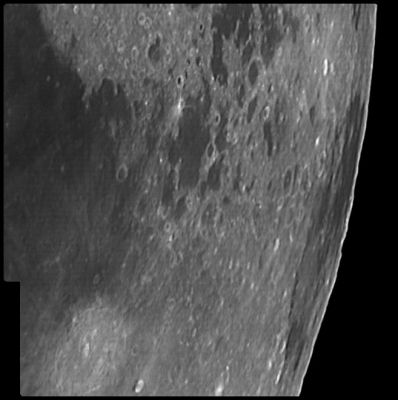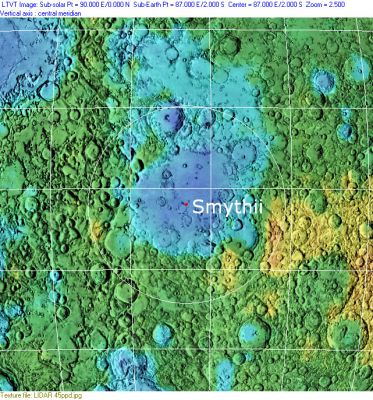Mare Smythii
Contents
Smythii Basin
(unofficial name; IAU name for central 373 km of mare: Mare Smythii)
|
Lat: 1.3°N, Long: 87.5°E, Main ring diam: 740 km, Basin depth: 5.0 km, Rükl: 38 | |
Images
LPOD Photo Gallery Lunar Orbiter Images Apollo Images
- Apollo 15 view
- At the start of Lunar Orbiter 1's photos is an interesting series of orbital close ups of Mare Smythii. Research: Danny Caes.
- Orbital Apollo photographs of the bright star-shaped high albedo craterlet at Mare Smythii's northern rim:
- Coordinates: 4° North/ 88° 55' East (see also LAC 63 (page 126) in the Clementine Atlas)
- AS10-33-4886
- AS10-34-5081 (color photograph, the bright craterlet's location is near the frame's left margin)
- AS11-42-6295 (vertical close up)
- AS11-42-6296 (vertical close up, a bit brighter than 6295)
- AS11-43-6452 (vertical close up)
- AS15-P-9108 (scroll toward the bright craterlet's location a little bit beyond the centre of this horizontal bar-shaped photograph)
- AS17-P-2573
- AS17-P-2578
- AS17-P-2580
Research: Danny Caes
Maps
Basin Classification
(description of terms and most numeric basin data from Wood, C.A. (2004) Impact Basin Database)
| Certainty of Existence |
USGS Age |
Wilhelms Age Group |
Ring Diameters |
Mare Thickness |
Mascon |
| Probable |
Pre=Nectarian |
5 |
260, 370, 540, 740, 1130 km |
1.2-1.3 km |
Yes; +43 mG gravity anomaly |
Description: Wikipedia
Additional Information
- Depth data from Kurt Fisher database
- Pike, 1976: 3.5 km
- Mare area of 51,950 km^2 according to measurements by Jim Whitford-Stark.
Nomenclature
- The IAU feature name honors William Henry Smyth (January 21, 1788 – September 9, 1865), a British astronomer. In 1825 he retired from the Navy to establish a private observatory in Bedford, England, equipped with a 5.9-inch refractor telescope. He used this instrument to observe a variety of deep sky objects over the course of the 1830s, including double stars, star clusters and nebulae. His notes on 1,604 double stars and nebulae resulted in a two volume book which became a standard reference and a model for the many amateur observing guides that follwed. No astronomer had previously made as extensive a catalogue of dim objects such as this. Subsequent to its publication Smyth was awarded the Gold Medal of the Royal Astronomical Society and served for two years as its President.
- The impact basin is named after the mare.
- The area containing the mare was originally named Kästner by Johann Schröter, but Beer and Mädler reportedly constrained that name to the crater that currently bears the name.
- British amateur John Lee recommended renaming Schröter's original feature Mare Smythii on pages 7-9 of the Notes Section of the Report of the 1863 Meeting of the British Association. This recommendation was adopted in Neison, 1876.
- Lee notes that "the name of Kästner is but little known in this country, and is of mere local interest, while the name of "Smyth," as the Rev. T. W. Webb remarks, "is not merely of English but of universal celebrity." It is therefore proposed to retain the name "Kästner" for the smaller and more ancient formation, and to commemorate the rediscovery by designating the larger and more modern plain by the name of the gallant admiral who has contributed so largely, not only to the advancement of astronomy, but also to the pleasure of every practical astronomer, by the publication of his most interesting '(Celestial) Cycle.'"
- According to Ashbrook, 1984 (page 52) Smyth was a personal friend of Lee, to whom he eventually sold his refractor. In the same British Association report where Mare Smythii is named, Lee named the crater Piazzi Smyth in honor of Smyth's son Charles.
- The present feature was Catalog number 4779 (the very last entry) in Mary Blagg's Collated List, where it is said that Neison used this name, but Julius Schmidt called it Kästner and Beer and Mädler did not use it.
- In Named Lunar Formations the naming of Catalog number 4779 as Mare Smythii is erroneously attributed to Mädler (the name is not used in that book).
- Primary named formations on the dark floor of Mare Smythii (the bold/Italics names (non-IAU) are those which were printed on the Lunar Topographic Ortophotomaps)
- Avery
- Camoens (SSE of Schubert C)
- Dorsa Dana
- Dorsum Cloos
- Haldane
- Helmert
- Hume
- Hume Z (Li Po)
- Kao
- Kiess (together with nearby Widmannstatten these were the Wright Brothers during the heydays of the Apollo program).
- Lebesgue
- Peek
- Pirandello (east of Peek)
- Purkyne S (Milton)
- Purkyne U (Tasso)
- Purkyne V (Hugo)
- Runge
- Schubert C (Doyle)
- Slocum
- Swasey
- Talbot
- Tucker
- Warner
- Widmannstatten (together with nearby Kiess these were the Wright Brothers during the heydays of the Apollo program).
LPOD Articles
Keeping Up With The Smythiis
Deep, Young and Ashy
New Perspective, Old Image
A Young, Deep Mare
Out on a limb
What's New?
APOD articles
The Eagle Rises (Anaglyph of Apollo 11's LM -Eagle- (Ascent Stage) and Mare Smythii)
Lunar 100
L73: Difficult-to-observe basin scarp & mare.
Bibliography
- APOLLO OVER THE MOON; A VIEW FROM ORBIT, Chapter 2: Regional views, Figure 22.
- Hill, Harold. A Portfolio of Lunar Drawings, pages 34-36.
- Lee, J. 1864. "On the Lunar "Mare Smythii," the walled Plain "Rosse," the "Percy Mountains," and the newly named Craters, "Phillips," "Wrottesley," "Chevallier," and "Piazzi Smyth." Report of the British Association for the Advancement of Science 1863 Meeting. Notices Section (at end), pp. 7-9 (the name is also used in on p. 4, in an earlier article by W. R. Birt).

